Sleep Aids
Over-the-counter sleep aid tablets are designed to support those who find it challenging to drift off at night or stay asleep. Available directly from pharmacies, these sleep aids often contain antihistamines and can be purchased without the need for a prescription. Read More…

-
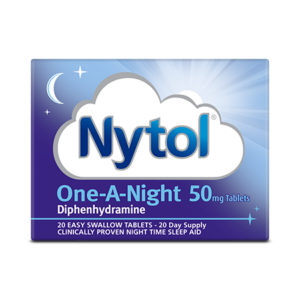
Nytol One-A-Night 50mg – 20 Tablets
- Relieves Insomnia
- Easy To Swallow Tablets
- Active Ingredient: Diphenhydramine
£8.69 Select options -
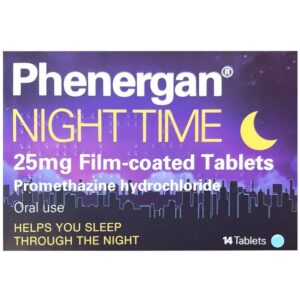
Phenergan Night Time 25mg – 14 Tablets
- Active Ingredient: Promethazine Hydrochloride
- Provides Short Term Relief For Insomnia
- Buy With Confidence From UK Registered Pharmacy
£6.59 Select options -
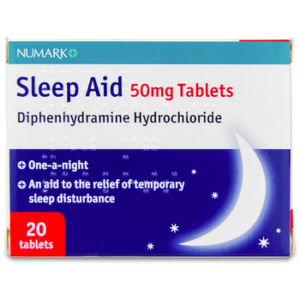
Numark Night Time Sleep Aid – 20 Tablets
- Reduces Time Needed To Fall Asleep
- Aids Relief Of Temporary Sleep Disturbance
- Inreases Depth And Quality Of Sleep
£3.99 – £4.99 Select options -
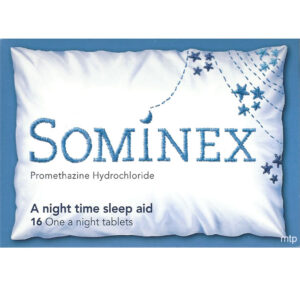
Sominex Tablets – 16 Tablets
- Promethazine hydrochloride
- Sedative anti-histamine
- Used for short-term sleep problems
£6.99 Select options -
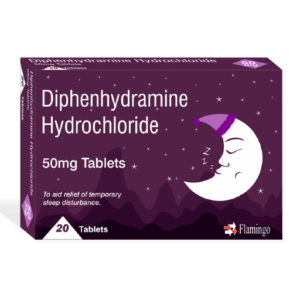
Diphenhydramine Hydrochloride 50mg Tablets – 20 Tablets
- To aid relief of temporary sleep disturbance
- Antihistamine with sedative properties
- Active substance: Diphenhydramine Hydrochloride
£4.99 Select options -
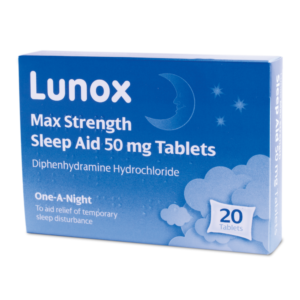
Lunox Sleep Aid Tablets – 20 Tablets
- Reduces Time Needed To Fall Asleep
- Aids Relief Of Temporary Sleep Disturbance
- Inreases Depth And Quality Of Sleep
£5.39 – £7.19 Select options -
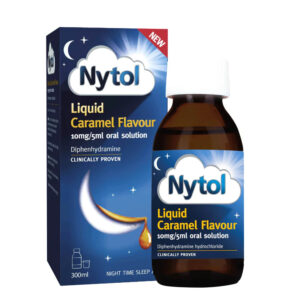
Nytol Liquid 10mg/5ml – 300ml
- Relieves Insomnia
- Easy To Swallow Liquid
- Active Ingredient: Diphenhydramine
£12.49 Select options -
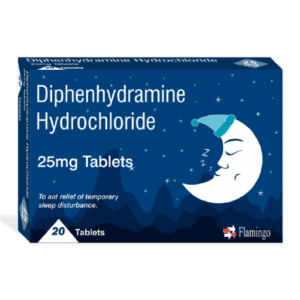
Diphenhydramine Hydrochloride 25mg Tablets – 20 Tablets
- To aid relief of temporary sleep disturbance
- Antihistamine with sedative properties
- Active substance: Diphenhydramine Hydrochloride
£3.99 Select options -
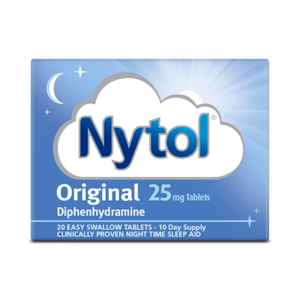
Nytol Original 25mg Tablets – 20 Tablets
- Helps you get back into your normal sleep rythm
- Taken 20 minutes before bed
- Active ingredient: Diphenhydramine
£5.39 Select options -
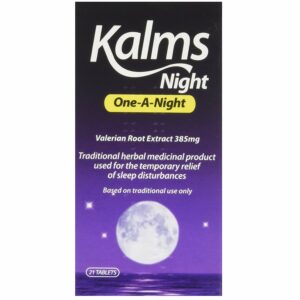
Kalms Night One-A-Night – 21 Tablets
- Relieves Insomnia
- Easy To Swallow Tablets
- Buy With Confidence From UK Registered Pharmacy
£5.19 Read more -
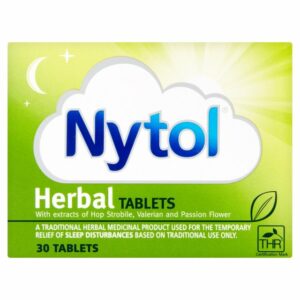
Nytol Herbal Tablets – 30 Tablets
- Relieves Insomnia
- Easy To Swallow Tablets
- Active Ingredient: Diphenhydramine
£6.09 Select options -
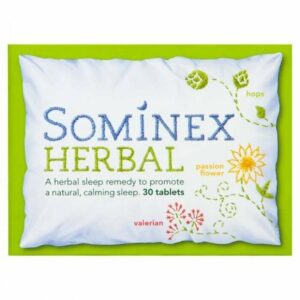
Sominex Herbal Relief Tablets – 30 Tablets
- Herbal sleep remedy
- Promotes natural, calming sleep
- Hops, passion flower and valerian
£4.69 Select options -
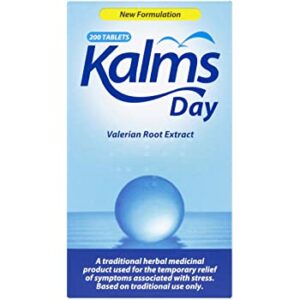
Kalms Day Tablets – 200 Tablets
- Relieves Insomnia
- Easy To Swallow Tablets
- Buy With Confidence From UK Registered Pharmacy
£8.29 Read more -
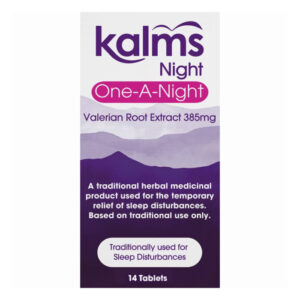
Kalms Night One-A-Night – 14 Tablets
- A traditional herbal medicinal product
- Temporary relief of sleep disturbances
- Contains Valerian Root Extract 385mg
£5.99 Add to basket
-
About Sleeping Aid Medications
Over-the-counter sleep aids can be a practical option for those struggling with occasional sleeplessness. These products generally include ingredients such as antihistamines, and valerian root, each with its own mechanism to aid sleep.
Antihistamines like diphenhydramine and are common active ingredients in many OTC sleep aids. They have a sedative effect that can help users fall asleep more easily. However, these are usually recommended for short-term use as the body can build tolerance, and they may leave some feeling groggy the next day.
Valerian root is another component found in sleep products. It’s an herb that might interact with the brain’s neurotransmitter signalling and has been traditionally used to relieve anxiety and improve sleep quality.
-
Symptoms
Individuals with sleep issues often experience a range of symptoms beyond difficulty falling asleep. Common symptoms include:
Excessive daytime sleepiness, feeling very tired throughout the day even when one might expect to feel rested.
Unintended bouts of sleep at inappropriate times, which can be dangerous, such as nodding off while driving.
Irregular breathing patterns during sleep, which might include pauses in breathing or shallow breaths, often associated with sleep apnoea.
Restlessness or a strong urge to move while trying to fall asleep, often observed in conditions such as Restless Legs Syndrome (RLS).
Frequent awakenings during the night and trouble returning to sleep, leading to fragmented and unrefreshing sleep.
Waking up too early and not being able to fall back asleep, which can significantly shorten the total sleep time.
Emotional effects such as feeling down, increased irritability, and mood swings due to lack of restorative sleep.
Cognitive impacts like difficulty concentrating and a decreased ability to perform daily tasks efficiently.It’s important to address these symptoms, especially if they persist, as they can lead to a decline in overall health and well-being. When such symptoms are noticeable and affect day-to-day functioning.
-
Diagnosis
Diagnosing sleep disorders generally starts with a consultation with a healthcare provider, who will review the symptoms and medical history. The process might include a physical examination, and in some cases, they may request the patient to keep a sleep diary to document their sleep patterns and experiences. This diary can track bedtime routines, the time it takes to fall asleep, the number of awakenings during the night, and any daytime naps or feelings of drowsiness. Additionally, devices like actigraphs might be used to monitor rest and activity cycles.
For more complex cases, the healthcare provider may refer the patient to a sleep specialist and recommend a polysomnogram, which is a comprehensive sleep study. This study is conducted overnight and records various body and brain activities during sleep. Analysis of this data can help to diagnose sleep disorders like insomnia, sleep apnoea, restless legs syndrome, or narcolepsy, among others.
-
Treatments
Over-the-counter sleeping tablets can be an effective aid for those experiencing occasional sleeplessness. They typically include ingredients such as antihistamines, which can have a sedative effect that helps to induce sleep. It’s important to note that while these medications can be helpful for short-term use, they may become less effective over time as the body builds a tolerance. There is also the risk of feeling groggy or unwell the next day, often referred to as a ‘hangover effect’ from the medication.
Here’s some highlighted products that we offer and how they can assist:
Nytol One-A-Night provides relief from insomnia through its active ingredient Diphenhydramine, which is known for its sedative properties.
Phenergan NightTime contains Promethazine Hydrochloride, which offers short-term relief for insomnia.
Numark Night Time Sleep Aid helps reduce the time needed to fall asleep and can aid in relieving temporary sleep disturbances.
Sominex Tablets also use Promethazine Hydrochloride as a sedative to address short-term sleep problems.It’s crucial to use these products as directed and consult with a healthcare provider if sleep issues persist, as they could indicate an underlying condition. For long-term sleep concerns, lifestyle changes and speaking with a healthcare provider for a personalised treatment approach is recommended.
-
Prevention Strategies
Improving sleep and preventing sleeplessness involves several strategies that target both your environment and habits. Here are some tips compiled from various sources:
- Stick to a sleep schedule by going to bed and waking up at the same time every day, even on weekends, to regulate your body’s internal clock.
- Create a restful sleeping environment. Your bedroom should be dark, quiet, and cool. Consider using room-darkening shades, earplugs, or a white noise machine to create an environment that suits your needs .
- Pay attention to what you eat and drink. Avoid heavy or large meals within a couple of hours of bedtime. Nicotine, caffeine, and alcohol deserve caution.
- Include physical activity in your daily routine, which can promote better sleep. However, it’s not recommended close to bedtime .
Remember, while these tips can be very helpful for occasional sleeplessness, persistent sleep problems may require medical attention to address possible underlying health issues.












